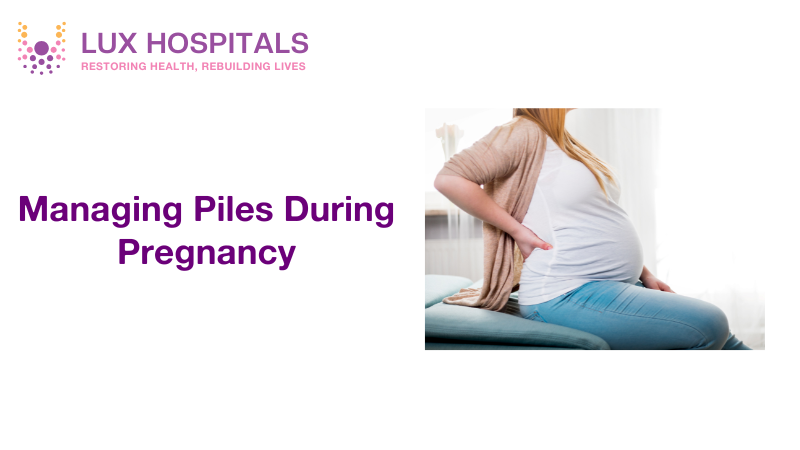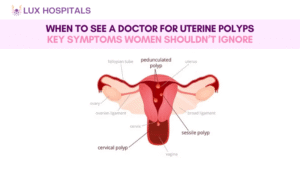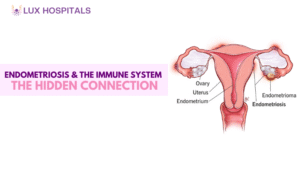Managing Piles During Pregnancy: Tips and Remedies for Relief

Pregnancy is a beautiful yet challenging phase in a woman’s life. While the excitement of welcoming a new life brings joy, certain health concerns, like piles during pregnancy, can make the journey uncomfortable. Piles, also known as hemorrhoids, are swollen veins in the rectal area that can cause pain, itching, and discomfort. Many pregnant women experience this condition due to hormonal changes, increased pressure on pelvic veins, and constipation.
In this blog will explore the symptoms, causes, and effective remedies to manage piles during pregnancy and ensure a more comfortable experience.
Understanding Piles During Pregnancy
Piles are a common condition due to swelling blood vessels in the rectum. These can be internal or external. Pregnancy increases the likelihood of developing piles due to various physiological changes in the body.
Causes
Pregnancy piles are caused by a number of causes, including:
- Increased Pressure on the Pelvic Area: As the uterus expands, it exerts pressure on the rectal veins, leading to swelling and inflammation.
- Hormonal Changes: The hormone progesterone relaxes the walls of blood vessels, making them more prone to swelling.
- Constipation and Piles During Pregnancy: Hormonal fluctuations slow digestion, causing constipation, increasing strain during bowel movements and leading to piles.
- Increased Blood Volume: Pregnancy increases blood supply, putting extra pressure on veins, especially in the lower body.
- Lack of Physical Activity: Reduced movement due to fatigue or pregnancy discomfort can contribute to poor circulation and worsening piles.
Symptoms
Identifying these symptoms can help in seeking timely relief. Some common symptoms include:
- Pain or discomfort while passing stools
- Swelling and lumps around the anal area
- Itching and irritation in the rectal region
- Bleeding during bowel movements (bleeding piles during pregnancy)
- A sense of incomplete evacuation following bowel movements
Effective Remedies for Managing Piles During Pregnancy
While piles can be distressing, several natural and medical remedies can provide relief. Here are some practical ways to manage piles during pregnancy:
1. Dietary Changes
Food high in fibre can prevent constipation and minimize straining while defecating. Include:
- Fruits such as papaya, orange, and apple
- Vegetables such as spinach, carrot, and beans
- Whole grains such as oats and brown rice
- Nuts and seeds to provide additional fibre content
2. Adequate Fluid Intake
Drinking at least 8-10 glasses of water every day makes stools soft, which is easily passed and also prevents constipation and piles during pregnancy.
3. Regular Exercise
Mild exercises such as walking, prenatal yoga, and Kegel exercises can increase blood flow and avoid worsening of piles.
4. Do Not Strain When Passing Bowel Movements
Straining puts excessive pressure on veins in the rectum and worsens piles. When sitting on the toilet, use a footstool to promote a natural bowel movement position.
5. Warm Sitz Baths
A warm water bath for 10–15 minutes several times a day can relieve discomfort, itching, and swelling.
6. Use Ice Packs
A cloth-covered ice pack placed over the swollen area may help ease swelling and block pain.
7. Over-the-counter ointments and creams
Use over-the-counter creams or ointments prescribed by your doctor to ease relief of piles. A few medicated wipes also aid in soothing the swollen area.
8. Proper Hygiene
Careful cleaning with unscented, damp toilet wipes rather than dry toilet paper avoids further irritation. The anal region must be kept dry and clean.
9. Sleep on Your Side
Sleeping on your left side reduces pressure on the rectal veins and improves blood flow, minimizing the risk of piles.
When to See a Doctor
While mild cases of piles during pregnancy can be managed with home remedies, medical attention is necessary if you experience:
- Severe pain that does not subside
- Excessive bleeding piles during pregnancy
- A lump that does not shrink with home remedies
- Signs of infection, such as pus or fever
Safe medical remedies, including prescription ointments, stool softeners, or, in extreme situations, minimally invasive surgeries, could be suggested by your doctor.
Conclusion
Treatment for pregnancy piles is challenging, but it can be reduced with the right medicine and lifestyle changes. Hygiene, exercise, a fiber-rich diet, and hydration can all help to avoid and treat the symptoms. To ensure a trouble-free pregnancy, you should seek the advice of a physician if you have recurring pain.
You can manage piles throughout pregnancy and concentrate on having a great time by doing small but effective things!
Frequently Asked Questions
Piles during pregnancy can be treated by eating a high-fibre diet, staying hydrated, taking warm sitz baths, and avoiding straining during bowel movements. If symptoms persist, consult a doctor for safe medications or treatments.
Sleep on your left side to reduce pressure on the rectal veins and improve blood circulation. Use a pregnancy pillow for support, and avoid sitting or lying down for long periods.
Yes, because of hormonal changes, constipation, and increased strain on the pelvic area, piles are frequent during pregnancy.
You can prevent piles by eating a fiber-rich diet, staying hydrated, avoiding straining during bowel movements, and engaging in regular physical activity.
No, piles do not affect the baby directly. However, severe pain and discomfort may cause stress for the mother, which is why management is essential.
Consult a doctor if you experience severe pain or excessive bleeding or if home remedies do not provide relief.
It is best to consult your doctor before using any medicated creams or ointments to ensure they are safe for pregnancy.
In many cases, piles resolve after childbirth, mainly if appropriately managed. However, some women may need additional treatment if symptoms persist.




















